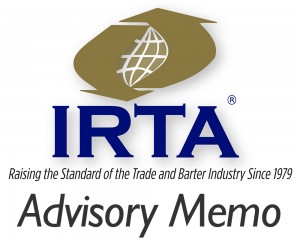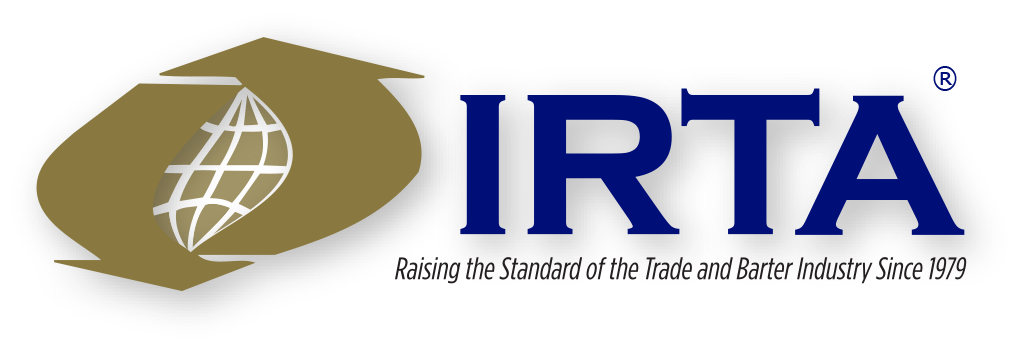
Advisory: Legal Liability for Trade Dollars in a Barter Exchange
Revised: March 3, 2014
Trade dollars are defined by modern commercial barter exchanges as “a unit of account denoting the right to receive, or the obligation
to pay, in goods or services available within a barter system.” This “valuable right” is founded on the contract between a trade exchange and its clients whereby clients agree to accept trade dollars in payment for goods and services. In the U.S., written pronouncements of the highest accounting and tax authorities have likewise held that trade dollars are a “valuable right.” Therefore, trade dollars are assets to their owners.
If trade dollars are assets, they must be the liability of someone. Many people unfamiliar with the barter industry, including some traders, believe trade dollars are the liability of the barter exchange which manages the barter system. That this notion is erroneous can be readily demonstrated.
A barter system is a network of reciprocal trading partners. This network is established by written contract between the barter exchange and its members. This written agreement establishes, among other things, the terms and procedures whereby members make purchases and sales to and from each other. When sellers accept trade dollars in payment, they are extending credit to the other members of the network. The other members collectively have the obligation to fulfill the trade dollars of any member by selling goods and services to the member.
If businessperson A goes to businessperson B and purchases the product or service of B “on account”, B has extended credit to A. In commercial law this is known as “open book credit”. B simply records on his books a receivable due from A.
A commercial barter exchange is based on the same idea, except that, rather than B’s doing the bookkeeping, the barter exchange acts as a third-party record keeper for all parties who join the barter system. The barter exchange keeps the books which reflects the purchases and sales of the members. The advantage of this system is that it enables multilateral trade to take place, therefore overcoming the disadvantages of conventional two-party barter.
In a barter exchange, A purchases from B, paying with trade dollars. B has extended credit to the members collectively, because the barter is incomplete and B has not yet been paid in goods and services. B may spend his trade dollars with anyone, looking to members as a group to provide him with fulfillment goods and services.
In sum, members who hold trade dollars (have net positive balances) are collectively owed goods and services by those who have borrowed from the system (have net negative balances). The legal liability to fulfill trade dollars rests on the members collectively who owe the system. Trade dollars are not the liability of the exchange, but of all members (including, perhaps, the exchange) who have spent more trade dollars than they have earned, and have thus borrowed from the system.
As trade dollars circulate throughout the system, and the debtor or creditor status of the membership continually changes, no single debtor (including the barter exchange) can be singled out as the liable party for any particular trade dollars. All that can be said is that the debtor members collectively owe the creditor members collectively.
Thus, legal liability for the fulfillment of trade dollars lies with the network of members, specifically with those who are in deficit in their account and owe goods and services to others in the barter system. The soundness of the trade economy depends on the creditworthiness of the debtor members and their contractual obligation to repay. It is expected that they repay their borrowing by making sales of their product or service to other members, thereby earning trade dollars and liquidating their indebtedness. If they fail to repay, loan losses must be absorbed by the entire barter network. This is done by charging a loan loss reserve account, which is owned not by the barter exchange but by the members of the barter network collectively. Loan losses reduce the supply of goods and services available within the trade system, and must be controlled through prudent credit extension.
Trade dollars have value because of the willingness and obligation of the members of the barter network to accept them as a means of payment and hold trade dollar balances. Members consent to accept and hold trade dollars because of their confidence that they are exchangeable for goods and services. Trade dollars are “backed” by (1) the goods and services of members of the barter network who have a contractual obligation to accept them as payment up to the prescribed limit, and (2) the obligation of the members who owe trade dollars to repay their debt.
Over time, some members may increase their borrowing to finance larger purchases. In this way, the number of trade dollars in circulation expands to finance a larger volume of trade. The legal liability to fulfill the outstanding trade dollars rests, as always, with the debtor members of the system. The loan loss reserve established by the exchange, through deduction from each member’s account, ensures there are at all times sufficient trade dollars to pay the indebtedness of the doubtful accounts.
A barter exchange is not like a commercial bank, which makes commercial loans and is liable for all demand deposits. A barter exchange does not extend credit, the members who accept trade dollars do. A barter exchange, as one of the members of the barter system, is liable only for its own borrowing (if any) and not for all the trade dollars in the system. The amount of borrowing by a barter exchange is limited by the members through the contracts in use in the barter industry.
In sum, the legal liability of redemption in goods and services of trade dollars in a barter system lies with the debtor members collectively. A barter exchange may or may not be a debtor member, and is liable only to the extent of its own borrowing. A barter exchange does not extend credit, only the members of the network collectively do. The exchange has a managerial role in the extension of credit among members, verifying creditworthiness, collecting delinquencies, etc., but has no credit-extending power of its own.
